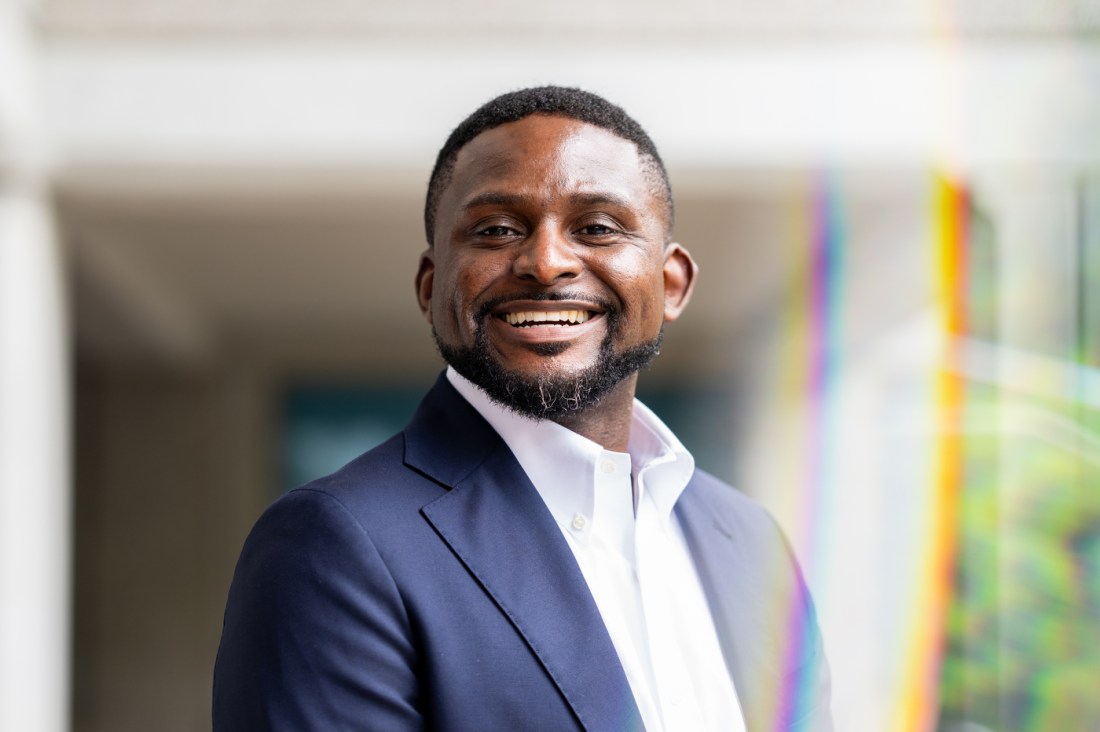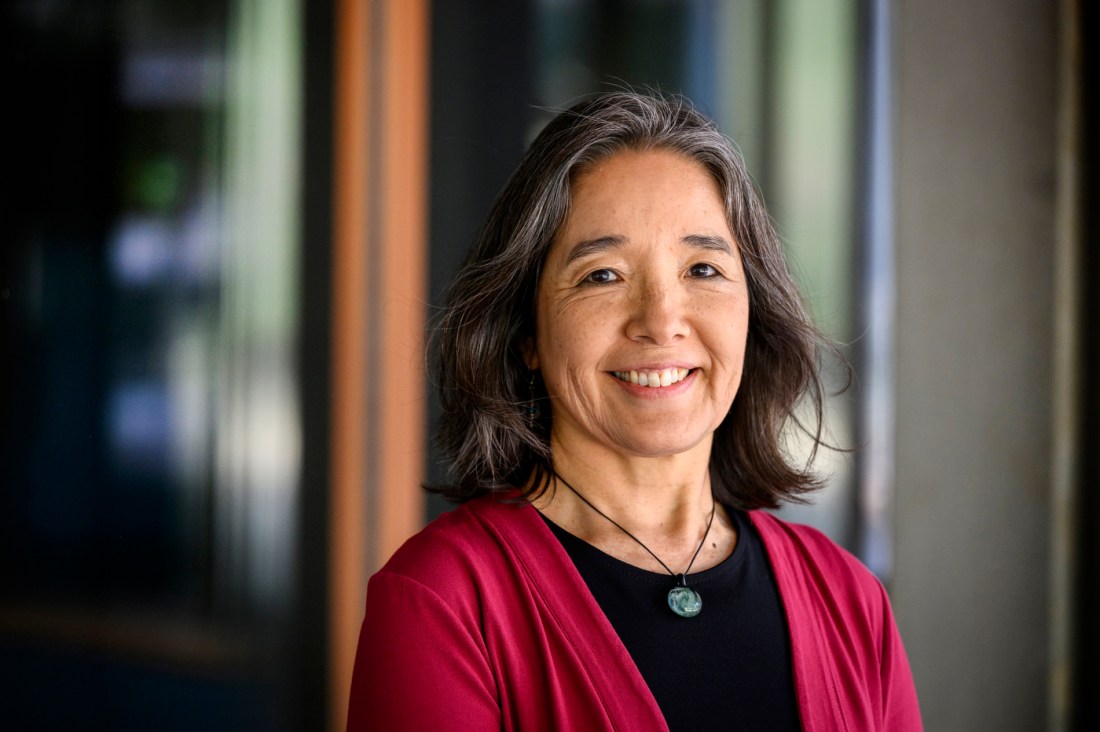Starting as a Husky in London or New York City ? Get excited
Tracey Osborne and Shannon Fairley-Pittman lead the university’s first-year global programs. They’re here to answer your biggest questions about a uniquely Northeastern experience.

Each fall, more than 1,500 undergraduates begin their Northeastern University careers in Oakland, London and now Manhattan. That’s a departure from the typical undergraduate experience, where four years rooted in one place might be expected. But Northeastern is made up of students on the move, Shannon Fairley-Pittman points out.
“Most student experiences at Northeastern are mobile ones,” says Fairley-Pittman, director of global first-year programs at Northeastern’s London and New York City campuses. “They might be on campus for a semester, then they’re going off on co-op. That’s real life, too.”
Students in the first-year scholars program are initiated into that culture of motion on day one. The program combines the community and rigor of the campus network with the chance to learn the ins and outs of a new city — and the preparation to hit the ground running upon arrival in Boston.
We asked Fairley-Pittman and Tracey Osborne, senior director of global first-year programs, about everything incoming global scholars and their parents need to know — from what to expect on their first day to the kinds of support and advantages that come with starting their undergraduate careers on a global campus.
What do you do at Northeastern?
“We’re part of the Global Experience Office, which is focused on experiential learning and global mobility,” Osborne says. With Fairley-Pittman, she oversees the programs for pre-matriculated undergraduates who will be in London and New York City (in collaboration with Marymount Manhattan College, which merged with Northeastern in 2025) for the 2025-2026 academic year, then come to Boston for their second year.


It works slightly differently in Oakland. As “matriculated” students, like those in Boston, Oakland Scholars have the option to come to Boston after their first year or to complete their undergraduate degrees from the Oakland campus.
What unique advantages come with the year in London or New York?
Osborne points out that each city — among the world’s biggest and most vibrant centers of industry, arts and commerce — serves up experiences students simply can’t get anywhere else.
“The city is their campus,” she says. “New York City has the financial [industry], performing arts, media. London is the financial capital of the world.”
Fairley-Pittman points to the career inroads such locations naturally make available, as well as the life experience that comes with navigating such bustling places. “These are big cities with lots of things to do for young people,” he says. When you are finished with college, you already know how to navigate some of those places. We see it as a feeder to adulthood and post-graduation success.”
The Scholars programs also have guided day and weekend trips built into the curriculum — to Edinburgh, Scotland or The Cloisters in New York, for two — meant to deepen students’ understanding of those places.
What supports are there on the global campuses for things like mental health, emergency preparedness and basic, everyday life?
Student residences in London and New York have student life coordinators on-call 24/7 — young professionals who live onsite and serve as the first point of contact for anything a student might need. That can range from grabbing a cup of coffee to discuss course enrollment to contacting medical or emergency services after hours.
Editor’s Picks
“The staff is trained to support folks in those emergency situations immediately,” Fairley-Pittman says. All campuses are plugged into Northeastern’s Global Safety and Support Network, as well, and have access to a suite of telehealth services and support groups. Upon arrival, students in London are encouraged to register with a local practitioner and dentist.
“There are a myriad of resources that we share in so many ways, but what’s great is [students] can just go to staff members in residence halls and on campus,” Fairley-Pittman says.
How does Northeastern prepare these students for returning to the Boston campus?
Once students in London and New York City arrive for the spring semester, preparations begin for the following fall, when they start classes in Boston.
“They get lots of emails about what’s coming up,” Osborne says. “Getting ready for registration, getting ready for housing, connecting them to their colleges and advisers, signing up for orientation in Boston. There’s a lot of work put into making sure they have what they need to transition.”
Around this time, the Global Experience Office begins a series of “transition webinars” where students can hear from Boston campus staffers who deal with everything from off-campus housing to advising; those resources live on a YouTube playlist.
Additionally, Northeastern makes sure that first years hear regularly from older students who have made smooth transitions between campuses, highlighting the way their year outside Boston was a benefit for their remaining undergraduate years. Those advantages include a leg-up when it’s time to go on co-op (settling into a strange city is nothing new) and coming in with a huge cohort of fellow first years with shared experiences.
“We have 900 London scholars and 300 New York City Scholars [for fall 2025],” Fairley-Pittman points out. When they get back to Boston, their friends are friends from these programs, because they’ve had this unique time together.”
What’s your advice for students and families embarking on this experience?
“Take full advantage of Welcome Week,” Osborne says. There’s a lot going on, and a lot of relationships that are built from that week. Of course there’s a lot of apprehension, but just really understand that we’ve done this before, and a lot of students have done this before.”
“Maximize those opportunities with the people that you’re with right in New York and London before getting to Boston,” Fairley-Pittman adds.
What are the most common worries you hear from incoming Scholars and their families?
“That they’re not part of the Northeastern network,” says Fairley-Pittman. “And sure, it’s a different context, but you are at a Northeastern campus. You will still have the traditions. You still have the black and red; you still have Paws the husky. This is part of a whole community, not just an island out in London or Manhattan.”
Coursework in the Scholars programs applies seamlessly toward a Northeastern undergraduate degree, of course, and there’s a ton of interaction with the other campuses. Student clubs from across the network visit for in-person events; organizations including Northeastern’s student government have a robust virtual presence, so that involvement isn’t precluded to the Boston-based student body.
“They see that as a benefit to be in front of these students and say ‘Hey, as soon as you come back to Boston, we’re ready for you,’” Fairley-Pittman says.
Helpful links:
New York City Scholars
London Scholars
- Frequently Asked Questions
- Northeastern London Instagram
- London Scholars Instagram
- Residence Life Instagram
- Student Life Instagram
Schuyler Velasco is the campus & community editor for Northeastern Global News. Email her at s.velasco@northeastern.edu. Follow her on X/Twitter @Schuyler_V.





